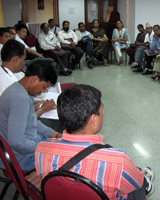Community radio for sustainable development was the focus of 2nd AMARC Conference in Bangalore
16-03-2010 (Bangalore)

2nd AMARC Asia-Pacific
Conference
© UNESCO
Community radio broadcasters from 20 countries of the Asia-Pacific region have requested to place people’s communications rights at the centre of development. The Bangalore declaration issued at the conclusion of the 2nd AMARC Asia-Pacific Conference calls also for supporting initiatives providing access to digital opportunities and giving the voice to marginalised communities.
The UNESCO-supported 2nd AMARC Asia-Pacific Conference, held in Bangalore (India) from 20 to 23 February 2010, gathered around 300 community broadcasters, academics, representatives of NGOs, governmental and multilateral institutions, and donor organizations to discuss key issues facing the community broadcasting sector. Deliberations focussed on providing inputs to a regional action plan to guide the development of the community radio sector in the next four years. Participants from 20 Asia-Pacific countries attended several knowledge-sharing and capacity-building workshops and networked with their counterparts in the region.
One of the key points that emerged at the Conference was the need for placing people’s communications rights at the centre of development. The Bangalore declaration issued at the conclusion of the Conference calls for supporting initiatives that enable access to digital and other technological opportunities. Participants also highlighted the importance of creating spaces on the airwaves for diverse and marginalised groups, irrespective of caste, race, colour, gender, sexuality, faith, physical limitations or other differences.
While analysing the challenges currently faced by community radio in the region, the Conference reaffirmed the need for the oppressed and marginalised communities to take control over their own means of communication.
This 2nd AMARC Asia-Pacific Conference pledged to build alliances with grassroots and human rights movements for strengthening communities and the community radio movement, and put forward the rights of women, migrants, indigenous peoples and the poor. It also called for further recognition of community radio in the region as a tool for disaster preparedness, poverty reduction, inclusion, human rights, and climate change adaptation and mitigation.
UNESCO was one of the key donors that supported the Bangalore Conference. In line with its policy aimed at the development of community radio in Asia-Pacific, the UNESCO New Delhi Office closely cooperated with AMARC and the Indian NGO, VOICES, to organize this event.
One of the key points that emerged at the Conference was the need for placing people’s communications rights at the centre of development. The Bangalore declaration issued at the conclusion of the Conference calls for supporting initiatives that enable access to digital and other technological opportunities. Participants also highlighted the importance of creating spaces on the airwaves for diverse and marginalised groups, irrespective of caste, race, colour, gender, sexuality, faith, physical limitations or other differences.
While analysing the challenges currently faced by community radio in the region, the Conference reaffirmed the need for the oppressed and marginalised communities to take control over their own means of communication.
This 2nd AMARC Asia-Pacific Conference pledged to build alliances with grassroots and human rights movements for strengthening communities and the community radio movement, and put forward the rights of women, migrants, indigenous peoples and the poor. It also called for further recognition of community radio in the region as a tool for disaster preparedness, poverty reduction, inclusion, human rights, and climate change adaptation and mitigation.
UNESCO was one of the key donors that supported the Bangalore Conference. In line with its policy aimed at the development of community radio in Asia-Pacific, the UNESCO New Delhi Office closely cooperated with AMARC and the Indian NGO, VOICES, to organize this event.
 2nd AMARC Asia-Pacific Conference
2nd AMARC Asia-Pacific Conference© UNESCO
Related themes/countries
· Asia and the Pacific
· India
· Community Media
· Weekly newsletter
Share this story:














